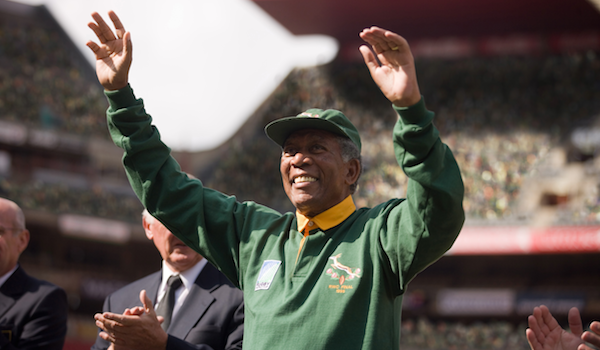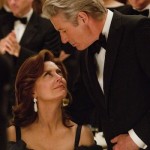Invictus Review
Clint Eastwood’s career this decade has followed an interesting trajectory. He started out with the pure popcorn “Space Cowboys” and the instantly forgettable thriller “Blood Work.” His next two trips behind the camera, however, resulted in two of the finest films of the decade, “Mystic River” and “Million Dollar Baby.” Those hoping for a Clint Eastwood renaissance would be disappointed, for it’s been all downhill from there. “Flags of Our Fathers” and “Letters from Iwo Jima” were grand in their intensions, but not in their execution. “Changeling” was just average, and “Gran Torino” was so over-the-top, I thought of “Invictus” more as an unwanted chore than an eagerly anticipated event. Therefore, I was surprised by how much I actually enjoyed the film. It’s far from perfect (in hindsight, I think it might do more things wrong than right), but overall, it was inspiring, and I was happy to spend the $8 and two-plus hours on it.
After apartheid was abolished in South Africa, the country was in peril. Blacks wanted revenge for all the hardship they had been put through, and whites wanted their country back. Nelson Mandela (Morgan Freeman) recognized the danger inherent in such division and knew if the country couldn’t be united, it would be lost. He had to put aside pressing national issues, such as crime, unemployment, and housing, in order to focus almost all of his energy and time on convincing the entire population to embrace the concept of the “rainbow nation.” One of his most ambitious initiatives was to turn around the national rugby team, the Springboks. The Springboks, who were led by their stoic captain Francois Pienaar (Matt Damon), were a symbol of the apartheid era. Black South Africans, including Mandela, were known to root for any country they were playing against. But with the Rugby World Cup coming up, and knowing it would be held in South Africa, Mandela saw promise in the Springboks and the young captain to accomplish his goal of uniting the country around them.
The biggest problem with “Invictus” is ironically the reason most people will see it. Eastwood’s direction is so heavy-handed it almost threatens to derail the proceedings. The message of racial unity is thrust at us so often and so obviously that it becomes quite frustrating. The storyline of the white and black security guards growing closer and the few scenes with the young black boy listening to the rugby match with the white policemen add nothing to the power of the story; they only increase the running time unnecessarily. One example of this would have been enough (the most resonant instance of it was the scene with the Springboks teaching the young black kids about rugby). The worst moment by far, however, was the song “Color Blind” which contains some of the most groan-inducing lyrics I’ve ever heard.
With that said, the film still works. The final rugby match is impressive. Rugby is obviously a big part of the story, and although the film doesn’t explain the rules very much, it’s not really all that necessary. The point is not to understand or even care about the rugby itself. Rather the rugby was the metaphor for racial unity (rendering all the other ones included unnecessary). And without really being able to explain it, the story resonated with me. Mandela had guts and forsight like no other modern leader had. The difference in the crowd’s reaction to Mandela shaking the Springboks’ hands at the start of the first match and the last match says it all. Mandela was a man with the whole nation’s interests at heart.
The acting in “Invictus” is a mixed bag. Morgan Freeman’s performance is solid. His accent is kind of all over the place (I imagine a South African accent is hard, but is it too much to ask for some consistency?), but at least he doesn’t ham it up too much. There’s no big inspirational speeches ala “Independence Day” or something like that. Mandela’s best moments are the quiet ones, such as when he shares tea and leadership styles with Pienaar. Matt Damon isn’t great, but he doesn’t really do a bad job either. His character shows little emotion, which also prevents Damon from going over-the-top, but it also hinders his ability to give the character any dimension. He’s pretty much flat the whole way through.
“Invictus” is such an Academy movie that it may suffer some backlash on that alone. With ten nominees, I’d be quite surprised if it doesn’t garner a Best Picture nod. Eastwood, the Academy’s darling, will be considered and may undeservedly squeak into the Best Director category, while Freeman is a shoo-in for Actor and Damon a likely candidate for Supporting Actor.
This is actually Eastwood’s best film in five years, but ironically, it works in spite of him, not because of him. His direction is heavy-handed in the worst way. Cliche after cliche is piled upon it. With so many obvious and occasionally cheesy metaphors, it’s easy for me to understand some of the hate. Yet, I found the overall story very uplifing. It’s something of a guilty pleasure. More of the film falters than succeeds, but I still would recommend it to just about anyone. I find it hard to believe that anyone seeing this film won’t at least walk out with a smile on his or her face.
















